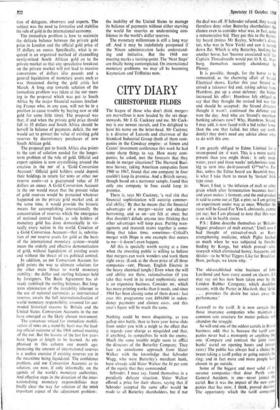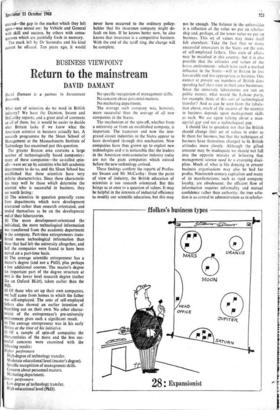CITY DIARY
CHRISTOPHER FILDES
The league of those who don't think mergers are marvellous is now headed by the AEI shop- stewards, Mr J. G. Cuckney and me. Mr Cuck- ney is our newest recruit, and I'm delighted to have his name on the letter-head. Mr Cuckney is a director of Lazards and chairman of the Standard Industrial Group (both of them com- panies in the Cowdray empire : at Simon and Coates' investment conference this week he had some sharp things to say. How many com- panies, he asked, met the forecasts that they made in merger situations? The Harvard Busi- ness Survey, taking American companies from 1960 to 1967, found that, one company in four couldn't keep its promise. And a British survey, though based on a narrower sample, found that only one company in four could keep its promise.
There is, says Mr Cuckney, 'a real risk that financial sophistication will outstrip commer- cial ability.' By that he means that the financial advantages of a merger—easier and cheaper borrowing, and so on—are felt at once; but that shouldn't delude anyone into thinking that other advantages will keep pace. Putting man- agement and research teams together is some- thing that takes time; sometimes—Crittall's merger with Hope is one example that occurs to me—it doesn't even happen.
All this is specially worth saying at a time when the investing public is willing to believe that mergers can work wonders and work them right away. (Look at the share price of all three companies—GEC, Plessey, English Electric in the heavy electrical tangle.) Even when the will and ability are there, rationalisation (if you take that word in its usual euphemistic sense) is an expensive business. Consider IPC, which has more printing works than it needs, and since 1964 has been closing some of them down: last year this programme cost. f694,000 in redun- dancy payments and closure costs, and this year's figure will be much the same.
Nothing could be more disquieting, as you gallop into battle, than to have your horse slide from under you with a neigh to the effect that it regards your charge as misguided and that, if anything, its sympathies lie with the enemy. Much the same trouble might seem to afflict the directors of the Butterley Company. They face an unwelcome approach from Slater Walker with the knowledge that Schroder Wagg, who were Butterley's merchant bank, have already sold Slater Walker the 16 per cent of the equity that they commanded.
Schroder, I must say, found themselves in a peculiarly delicate situation. Slater Walker offered a price for their shares, saying that if Schroder accepted the same offer would be made to all Butterley shareholders, but if not the deal was off. If Schroder refused, they would therefore deny other Butterley shareholders the chance even to consider what was, in fact, quite a remunerative bid. They put this to the Butter. ley board (minus Mr Bayley, Schroder's direc- tor, who was in New York) and saw it turned down flat. Which is why Butterley, looking for another horse, has 'become associated with' (as Captain Threadneedle would put it) S. G. War- burg, themselves recently abandoned by Plessey.
It is possible, though, for. the horse to be remounted, as the charming affair of Strand Electrical shows. Earlier this year Strand re• ceived a takeover bid and, taking advice from Hambros, put up a stout defence : the bidder increased his offer: Hambros felt obliged to say that they thought the revised bid was fair and should be accepted : the Strand directors thought it wasn't, continued the defence and won the day. And who are Strand's merchant banking advisers now? Why, Hambros. Strand, I may add, is now faced with a bid rather lower than the one that failed, but (they say confi- dently) they don't need any advice about what to do with this one. • I am greatly obliged to Edme Limited for a seven-pound tin ,)f wort. This is a more useful present than you might think : it only needs water, yeast and three weeks' unlaborious tend- ing to turn into do-it-yourself G**nn*ss. For that, unless the Edme board are Beamish boys, is what I take them to mean by 'instant' Irish type stout.
Wort, I find, is 'the infusion of malt or other grain which after fermentation beComes beer'; and yeast makes it ferment, and the end-product is said to come out at 54d. a pint; so I am getting an experiment under way at once. Whether the stout will be Good For You I, obviously, cannot yet say; but I am pleased to note that this wort is on sale in health stores.
P.S.: Edme describe themselves as 'Britain's biggest producers of malt extract.' Until now had thought of extract-of-malt as Roo's strengthening medicine, which Piglet loathed so much when he was subjected to forcible feeding by Kanga, but which proved—after research which eliminated honey, haycorns, and thistles—to be What Tiggers Like for Breakfast. Now, perhaps, we know why. • The old-established wine business of John Lovibond and Sons (very sound on clarets, if I may say so) has now been taken over by the London Rubber Company; which doubtless reasons, with the Porter in Macbeth, that 'drink . . . provokes the desire but takes away the performance.'
Farewell to the tariff. It is now certain that those insurance companies who maintain a common rate structure for motor policies will abandon the struggle.
So will end one of the oddest cartels in British business; odd, that is, because the tariff com- panies never had a monopoly or anything like one. (Compare and contrast the joint stock banks' cartel on Opening hours and interest rates.) The public has always had a choice be- tween taking a tariff policy or going outside the ring; and in fact more and more people have chosen to go outside.
Some of the biggest and most solid of in- surance companies—that dour Perth army. General Accident; is one—never joined the cartel. But it was the impact of the' new com- panies that has now, I think, proved decisive. The opportunity which the tariff companies created—the gap in the market which they left open—was seized on : by Vehicle and General with skill and success, by others with conse- quences which are painfully fresh in memory.
The mark left by Dr Savundra and his kind cannot be effaced. Ten years ago, it would never have occurred to the ordinary policy- holder that his insurance company might de- fault on him. If he knows better now, he also knows that insurance is a competitive business. With the end of the tariff ring, the change will be complete.







































 Previous page
Previous page